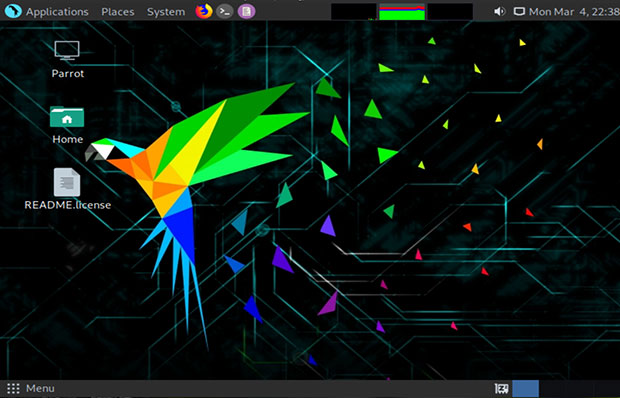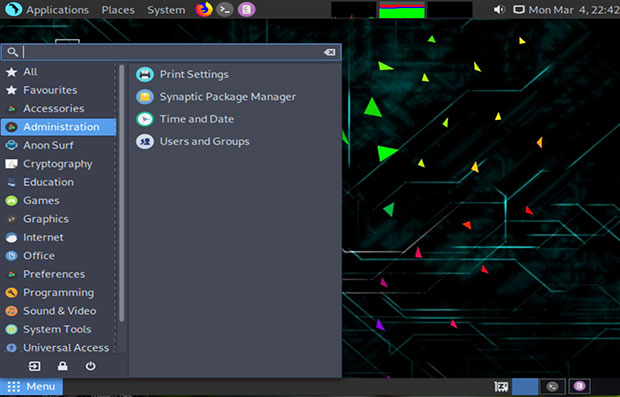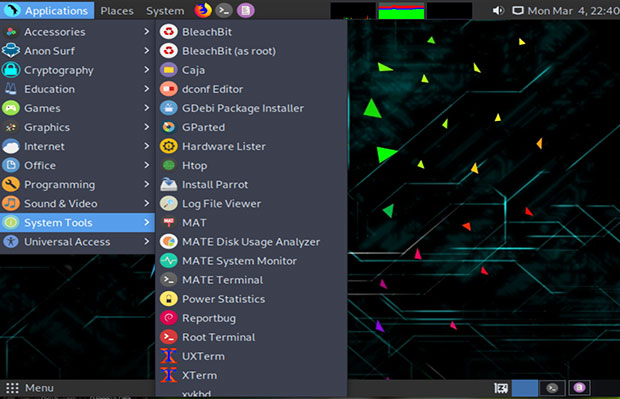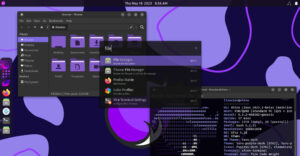
Parrot offers several options for running a Linux operating system that pays much closer attention to security matters.
If you already are handy with digital forensic tasks and want a state-of-the-art system to handle pentesting and privacy issues, check out the Parrot Security release.
For typical Linux users who just want a leg up on privacy protections built into an all-purpose operating system, Parrot Home edition could well be your do-everything Linux OS. A special edition designed for daily use, it includes easy-to-use applications to chat privately, encrypt documents with the highest cryptographic standards, and surf the Internet in a completely anonymous and secure way.

Parrot Home meets the needs of regular users who want a fully functional, lightweight desktop that is always updated. It has the look and feel of the regular Parrot environment, and it comes with all the basic programs for daily work.
For advanced users, the Parrot system also can be used as a starting point to build a very customized pentesting platform with only the bare essentials. Or, you can use it to build your professional workstation by taking advantage of all the latest and most powerful technologies of Debian without the hassle.
The Security Factor
Computer and Internet security are topics that typical computer users conveniently ignore. All too often, Linux users put their blind trust in a particular distribution and assume that all Linux OSes are equally more secure than other platforms.
Yes and no! Linux is much more hardened than other operating systems, but not all Linux distros are created with the same degree of attention to security and privacy control.
You might not be knowledgeable about or keenly attentive to things like firewall configurations, Web browser privacy settings, and router options, for example. That missing skillset can leave some gaping holes in otherwise well-designed Linux safety strategies.
Parrot Home edition offers an alternative to leaving your computer privacy and security to chance. I’ll leave the attributes of the Parrot Security edition for security professionals to check out separately. In this week’s Linux Picks and Pans review, I’ll focus on the benefits of the Parrot Home edition.
Why Use It?
Parrot provides general-purpose tools built around a Linux core that is tuned for security and forensics operations. The Home edition is a really solid everyday computing performer.
The added user benefits let you ease your way into more privacy-centric Web browsing and encryption. The tools that build in these enhancements are easy to use.
As your comfort zone expands, you can improve your security awareness and hone your skills while using a familiar set of everyday applications, like the ones other distros provide. Parrot is a win-win computing platform that gives you an easy leg up on better personal computing security.
Parrot Home Primer
The Home edition has the same look and feel as a regular Parrot environment and includes all the basic programs for daily work. The center point of the appearance is the MATE desktop.
MATE is a great choice. It is lightweight, fully functional, and very modern looking without bogging down your system with gaudy screen animations that consume system resources.
Lightweight does not mean the absence of settings controls. Quite the contrary. MATE’s control center panel provides all the system settings in one handy location.
The ability to fine-tune configuration options extends to several other menued spots. For instance, click the System button on the top panel to access Preferences for hardware, Look and Feel, Personal, and other pull-out categories. The Administration button opens access to Print Settings, Time and Place options, the Synaptic Package Manager, and User and Groups settings.
Look and Feel
Parrot implements a classic MATE design and then some. It has a top and bottom panel. You can eliminate either one and combine the menu and buttons onto a single bar, but the traditional two-panel design makes considerable sense.

MATE goes against a growing trend in new desktop environments to tidy up the desktop. It does not prevent the placement of icon launchers there.
Just right-click on an application in the main menu and select your choice of either pinning it to the desktop or adding it to the favorites display in the main menu. However, you can not pin application launchers to either panel bar. You can right-click anywhere on the desktop itself to get a context-specific popup menu.
Both top and bottom panels let you add applets that provide quick access to dozens of special features. Applets function much like extensions in Web browsers.
The geography of the two panels is well-designed. Most of what you normally see on a single-panel design is already configured on the top panel. A two-column cascading menu sits at the left of the bar. The Places and System dropdown menus are to the fight of the main menu button.
Icons to launch the Firefox Web browser, the MATE terminal, and the Pluma text editor sit in the center of the top panel. The right end of the panel holds several systems monitors, thumbnail displays, and the notifications area.
The bottom panel has a button on the far left that launches a two-column applications menu. A search window spans the top of the menu display. Three buttons reside at the bottom of the menu panel to control user and shutdown options.
The far right of the bottom panel shows the workspace switcher with four screens already configured at launch. The center section of the bottom panel shows minimized applications and thumbnails of all running windows.
Privacy Tools
One of the really nice qualities of the Parrot Home edition is the bundled privacy and security tools. The goal here is to give everyday users a set of applications to protect their privacy.
Of course, a more knowledgeable user could install these tools separately, but having the tools preinstalled and easy to find is something that makes this distro different from other Linux distros.
Consider the Home edition an upper-tier offering. Users who want even more hands-on control and develop a passion for being more involved with security can advance to the Parrot Security tier. That is where all the pentesting and digital forensics exposure happens.
Here is a rundown on the special bundle that Parrot Home edition provides:
- Use Anonsurf to hide your IP Address on the Internet. Anonsurf anonymizes the entire system under Tor using IPTables. It takes only one click each to start and stop the tool. Click the Check IP menu entry to get a readout of the current IP address your system is using.
- The Cryptography software makes it easy to create encrypted folders on your computer.
- The GNU Privacy Assistant is a graphical user interface for the GNU Privacy Guard. SiriKali is a Qt/C++ GUI application that manages ecryptfs-, cryfs-, encfs-, gocryptfs- and securefs-based encrypted folders.
- zuluCrypt is a tool for uncomplicated encryption of any data. It is handy for safeguarding personal data on an entire hard drive, or on external storage media such as USB thumb drives and external hard drives.
- zuluMount is a general-purpose mounting tool for unencrypted volumes and zuluCrypt-supported encrypted volumes. It is handy to use for mounting and unmounting volumes on a hard drive when running Parrot in live session mode from a USB or optical drive.
Everyday Software
One of the things I like best about the Home edition is it can serve as a fully functional portable Linux system. It runs well from a USB installation and a DVD drive as well.
Install Parrot Home edition to a hard drive as your everyday computing platform. The added privacy and security tools are always available. You have all the standard office and productivity tools available with less specialized Linux distros.

The default Web browsers are Firefox and Firefox ESR (Extended Support Release). Firefox comes with the No Script extension installed to prevent running JavaScript on your computer.
It keeps you safe from cryptojacking attacks and malicious scripts designed to monitor your activities. You also get Onion Circuits, Onion Share, Tor browser, plus lots more.
Office tools include LibreOffice Suite, HomeBank, and GNOME Planner. You also get the complete set of MATE apps such as image viewer, Shotwell photo organizer, and GIMP. A library of video and audio editing and viewer programs is included.
Bottom Line
The Home edition does not include a bevy of ethical hacking and testing and security apps that also are used for development, anonymity, and privacy. If you want those things, step up to the Parrot Security release.
If you want a well-tuned general-purpose Linux distro with a bonus offering of personal privacy tools, check out Parrot Home edition. It will not disappoint you in either performance or privacy.
The last Update is version 4.5, released in January.
Want to Suggest a Review?
Is there a Linux software application or distro you’d like to suggest for review? Something you love or would like to get to know?
Please email your ideas to me, and I’ll consider them for a future Linux Picks and Pans column.
And use the Reader Comments feature below to provide your input!






















































There is also a KDE Plasma Home edition live/installer that extends its appeal.